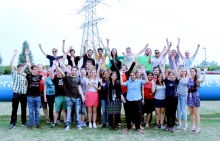
Winners of Intel Modern Code Developer Challenge announced
Intel and CERN openlab jointly announced the winners of the Modern Code Developer Challenge on 14 November at the annual Intel HPC Developer Conference. The goal of the competition, which was open to students across the globe, was to spur advancement in parallel coding and the science it supports, as well as encouraging students to pursue careers in the field of high-performance computing.
Students were challenged with optimising code used to simulate brain development. This code is focused on simulating the development of the normal and diseased brain, in order to identify the causes and potential treatments for brain disorders such as epilepsy and schizophrenia. This code is an integral part of a current CERN openlab research project in collaboration with Newcastle University.
“As science evolves, and more and more fields become driven by data and computing, such code optimization is vital in ensuring that the computing power of cutting-edge hardware is fully harnessed,” explains Alberto Di Meglio, head of CERN openlab.
The challenge attracted over 17,000 students from around the world representing over 130 universities across 19 countries. Over 1,200 students downloaded the code and over 1,000 participated in the free online training programme, choosing from over 20 hours of educational materials. These students have had remote access to Intel® Xeon® processor and Xeon Phi™ coprocessor-based clusters. Students were also provided free copies of the Intel® Parallel Studio XE Cluster Edition for their code optimizations.
Mathieu Gravey from Ecole des Mines d’Alès in France, was declared the grand prize winner. Impressively, he was able to reduce the code’s runtime on a large dataset from 45 hours to just under eight and a half minutes! He’s won a place in next year’s popular CERN openlab summer student programme. Three other students — those with the second, third and fourth fastest optimisations of the code — also won a trip to come to CERN for a guided tour of the laboratory. Other prize winners will receive a trip to attend next year’s ‘SC16’ supercomputing conference in Salt Lake City, Utah, USA.
“CERN openlab has played — and today continues to play — a key role in the development of the computer platforms used by physicists to understand the particle collisions that take place in the LHC,” says Di Meglio. “With future upgrades to the LHC set to further increase the rate at which particles collide, work to optimise the code behind these computing platforms, has never been more important than it is today.”
If you’re also interested in becoming a CERN openlab summer student, please visit our dedicated page to find out more. Applications for the 2016 summer student programme will open in early December.











